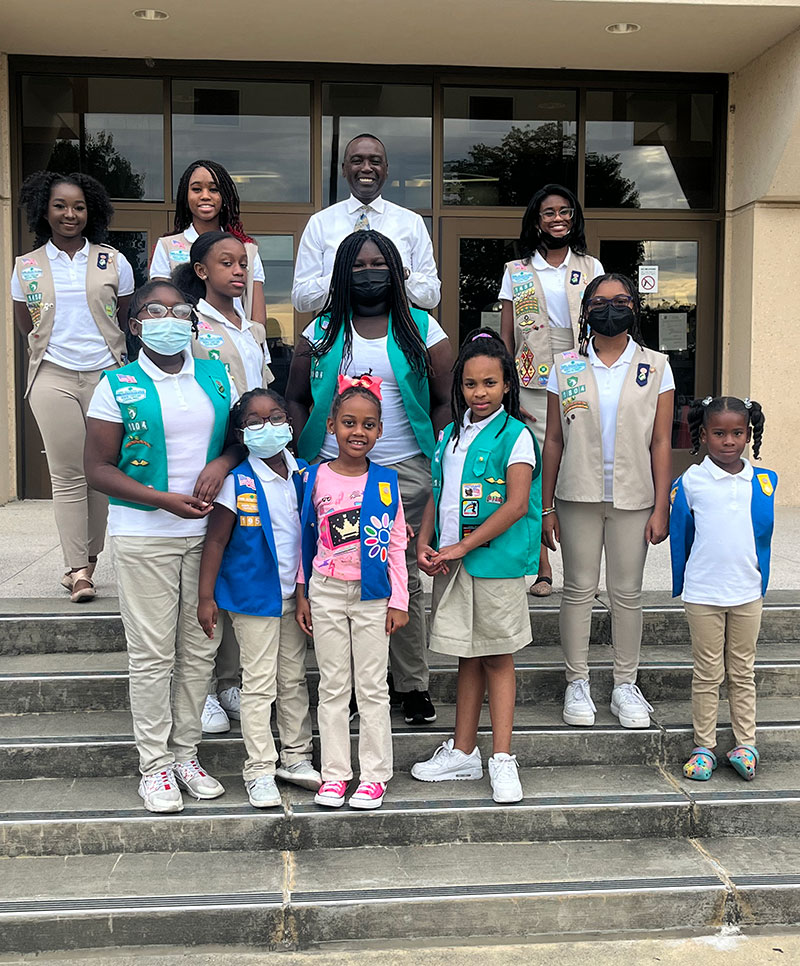By Tracey C. Morrison
FAYETTEVILLE, NC – While staying attentive to the news, the writer came across a breaking story last month about President Joe Biden pardoning the prison sentences of approximately 1,500 individuals, including his son, Hunter Biden.
This historic act of mercy, the most significant single-day event in the history of criminal justice reform, offered a glimmer of hope and a fresh start to the incarcerated individuals.
Many lawmakers have always sought to give people with criminal records a chance through proposed and/or enacted laws in hopes of them redeeming themselves. Charles Evans is an example of a man who became the narrator of his redemption story as he reintegrated back into society. Let’s dive in to learn more about Evans’ story.
The exceptional leaders who surrounded Evans later influenced his career trajectory. His childhood pastor, the Reverend Dr. M.F. Ward, at Mattock Memorial AME Zion Church, was highly engaged in his community, supporting the union and inviting community-driven individuals to the church.
Among those who visited the church was Sylvia Ximines Allen, a civil rights activist, attorney, and public servant. Allen was the first Black woman to serve as assistant district attorney in North Carolina and Cumberland County, whom Evans enjoyed helping with her campaign when she ran for judge.
From there, politics became more important to him as he ran for student body government in junior and high school. He also volunteered at the voting polls and held positions as the sophomore class black representative at Terry Sanford High School, vice president and president of the local youth NAACP, and second vice president of the state youth NAACP.
LIFE’S SETBACK
Despite Evans’ passion for helping others, he encountered life’s obstacles, such as being homeless in Washington, DC, and his battle with substances.
Over 30 years ago, his addiction led to three felony convictions (two embezzlement counts and one count of cocaine possession) at his job at one of the airlines at the Fayetteville Regional Airport to pay for his habit, according to the Fayetteville Observer.
“There was a time when I couldn’t represent [in his community] due to my struggles with addiction and embezzlement, but God opened a path for me to do so,” he stated.
After paying his dues for his conviction, he journeyed his heart back to his first love for servitude, which had always been his true identity. He stepped into the political field, running for office in 2003. He lost his first election but won the seat in 2005.
Critics questioned his decision to run, but Evans delivered a powerful message about the true meaning of servitude.
“Anyone can represent if they possess the heart of a servant. God will provide [to those with the] heart [of service],” he said.
POLITICAL CAREER AND ACHIEVEMENTS
After serving two terms on the Fayetteville City Council (2005-2009), he served as Cumberland County commissioner for three terms, including a position as County Chairman.
As a politician, Evans has an impressive track record. He supports the introduction of new city buses, advocates for the unhoused community, and spearheads an initiative to remove poorly conditioned mobile homes on Sapona Road and Bunce Road and replace them with newly improved affordable homes. He has also led initiatives to name local parks and recreation centers after prominent African Americans in the community, such as Geraldine B. Myers, Mable C. Smith, Jesse A. Brayboy, and Christina S. Smith.
As the county commissioner chairman, he sought funding for the county to build a homeless shelter, which broke ground last year. He approached the county’s District Attorney, Bill West, to bring an expungement clinic into the community. Other initiatives Evans spearheaded include taking legal action against Chemours Factory regarding the water pollution in Grays Creek and voting for the county to move forward in building a new Crown Coliseum in downtown Fayetteville.
During that period, he did all this while obtaining an associate degree from Fayetteville Technical Community College (FTCC) and a bachelor’s degree from UNC-Pembroke.
After serving as county commissioner in 2022, he ran for North Carolina Congressional District 7 in 2022 and mayor of Fayetteville in 2023 but was unsuccessful in both primaries.
Charles Evans’ work is far from over. His unwavering commitment to serving the community is a source of reassurance and confidence. As the director of Life is Worth Living—Project Fresh Start, he continues to assist those in need, demonstrating his dedication to making a difference.
In addition to his busy work, he recently started his podcast, Conversations with Charles Evans, was elected as the 1st Vice President for the Cumberland County Senior Democrats, and pledged to Phi Beta Sigma Fraternity, Inc. He also has another upcoming expungement clinic in partnership with District Attorney West. When asked if he plans on running for politics, Evans said he plans to get back in the ring to run for County Commissioner at-large.
Evans’ inspirational story is his determination to not give up on himself and his faith in God. He details that the key to his success is remaining resolute in his prayer life and trusting that support exists beyond his immediate surroundings. According to Evans, support can guide you from point A to point B, but perseverance is essential.
His story serves as a reminder of a man who embraced the narrative that often plagues many formerly incarcerated individuals seeking redemption and reintegration into society.

